By Kent R. Kroeger (NuQum.com, November 3, 2019)
President Donald Trump should familiarize himself with the Jewish Sicarii from the First Jewish-Roman War (66 AD — 73 AD). The Sicarii, a splinter group of the Jewish Zealots, are most revered for their last stand against the Romans on the mountain fortress at Masada (in Israel near the Dead Sea).
Faced with certain annihilation by the Romans in 74 AD, the 960 Jewish Sicarii on Masada took their own lives, thereby denying the Romans the full satisfaction of victory.
In politics, the metaphorical equivalent to suicide is ending your candidacy for public office.
Now is the time for someone Trump trusts to walk the President through the different scenarios most likely to unfold over the next 12 months. None of them end well for the President. But one scenario ends demonstrably better than the others.
First, consider Trump’s worst-case scenario — the path he is on now — in which he is impeached, put on trial by the U.S. Senate, and is either removed from office and/or suffers a landslide defeat at the polling booth on November 3, 2020.
There is no electoral path to victory for Trump in 2020. There will be no surge in Hispanic or African-American votes large enough to give Trump another surprise victory. There will be no backlash over the impeachment hearings and Senate trial large enough to give him the victory either. And the strong economy will not push independents and swing voters overwhelmingly into his corner.
What if the Democrats nominate a deeply-flawed candidate? In all likelihood, they will nominate such a candidate — and Trump still won’t have the votes to win.
Based on the most current polling data, Trump’s maximum potential in the popular vote percentage is in the mid-to-upper-40s. With these numbers, the best-case scenario for Trump is that he doesn’t lose on a Jimmy Carter-like scale.
A strong third-party candidacy from the left or center-left could alter the scenario probabilities. Yet, despite Jonathan Chait’s recent evidence-free rant on the subject, there is no indication that this will happen. It could, but — as of now — not likely.
And the cocksure pundits saying Trump can still win in 2020 are many of the same ones that said he had no chance of winning in 2016.
Rest easy, Democrats. This time around, there really is no meaningful chance of another election surprise by Trump.
Donald Trump will not be re-elected president and here is why…
He has run out of time. One year may seem like an eternity in politics, but in the domain of presidential approval, one year is the blink of an eye.
Like Secretariat’s head-of-the-stretch move in the last quarter of the 1973 Kentucky Derby, relatively unpopular first-term presidents who eventually win re-election are already starting their approval surge by this point in their presidency (e.g., Reagan, Clinton, and Obama).
Trump is not Secretariat. According to the RealClearPolitics.com poll average, his job approval has been stagnant since May 2018 (see Figure 1) and, with impeachment hearings in the near future, the prospects for sustained approval growth are doubtful.
Figure 1: Trump Job Approval (Poll Averages)
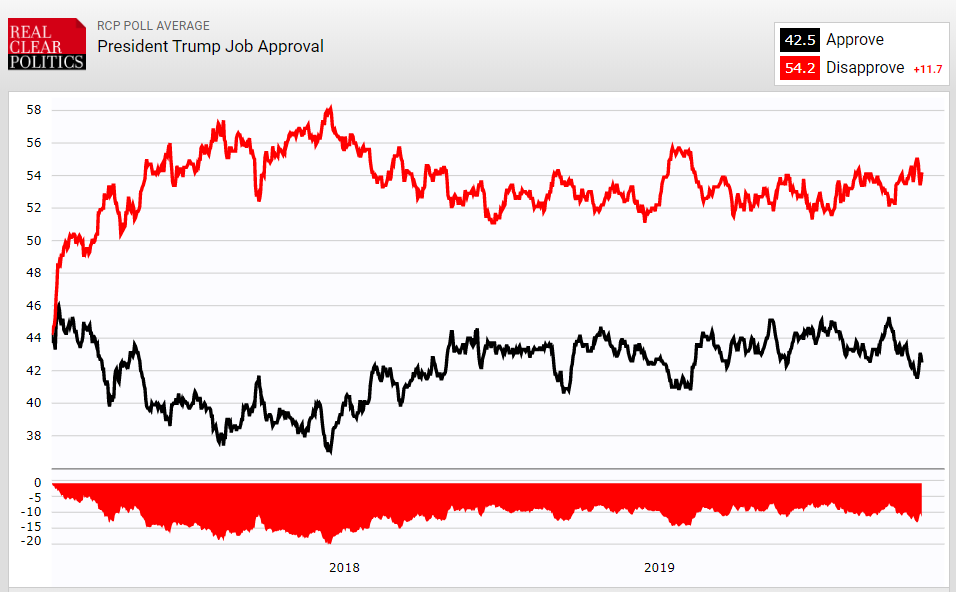
According to the Gallup Poll, at this juncture in his presidency Trump is significantly behind Bill Clinton, G. W. Bush, and Ronald Reagan — all incumbent presidents that were re-elected (see Figures 2 and 3). At 39 percent job approval in mid-October 2019, Trump is 10 points behind Clinton’s pace and 16 points behind G. W. Bush.
Figure 2: Job Approval During First-Term for Trump, GW Bush, and Clinton
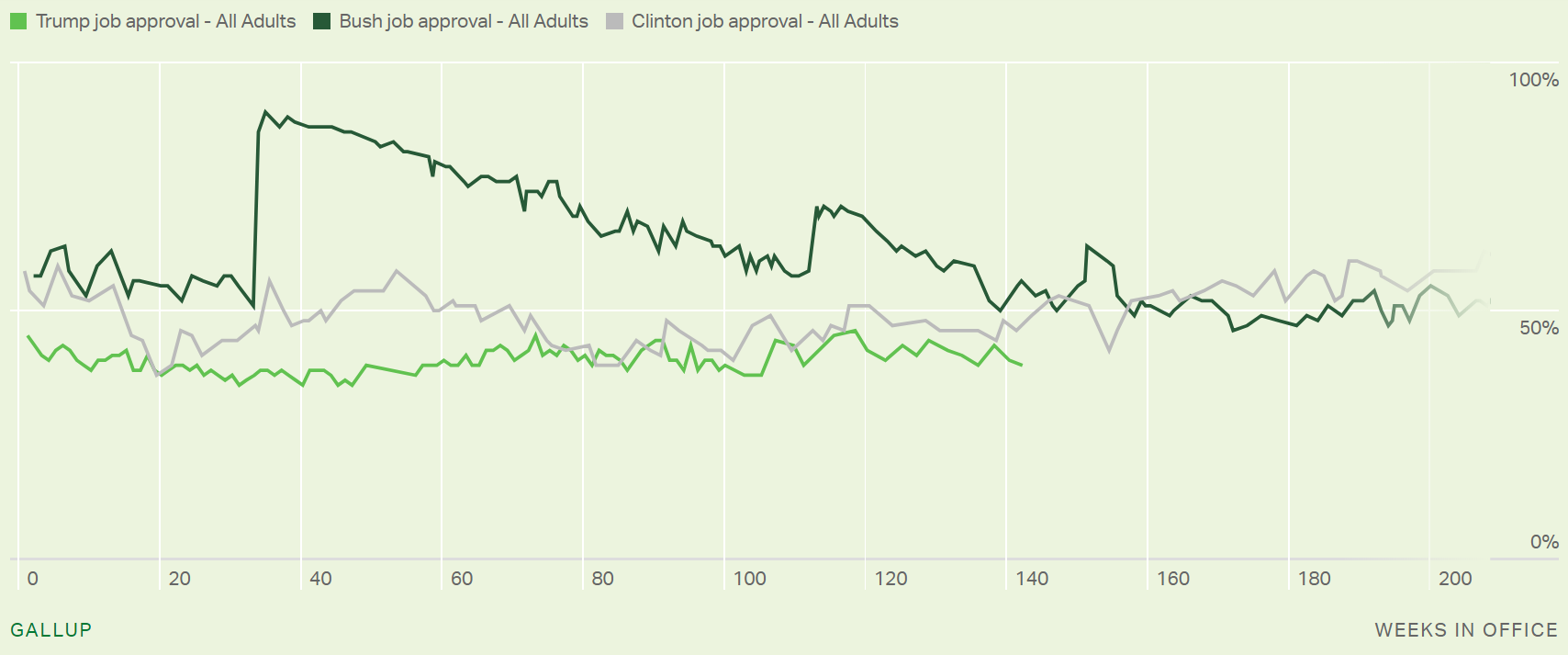
Figure 3: Job Approval During First-Term for Reagan and Trump
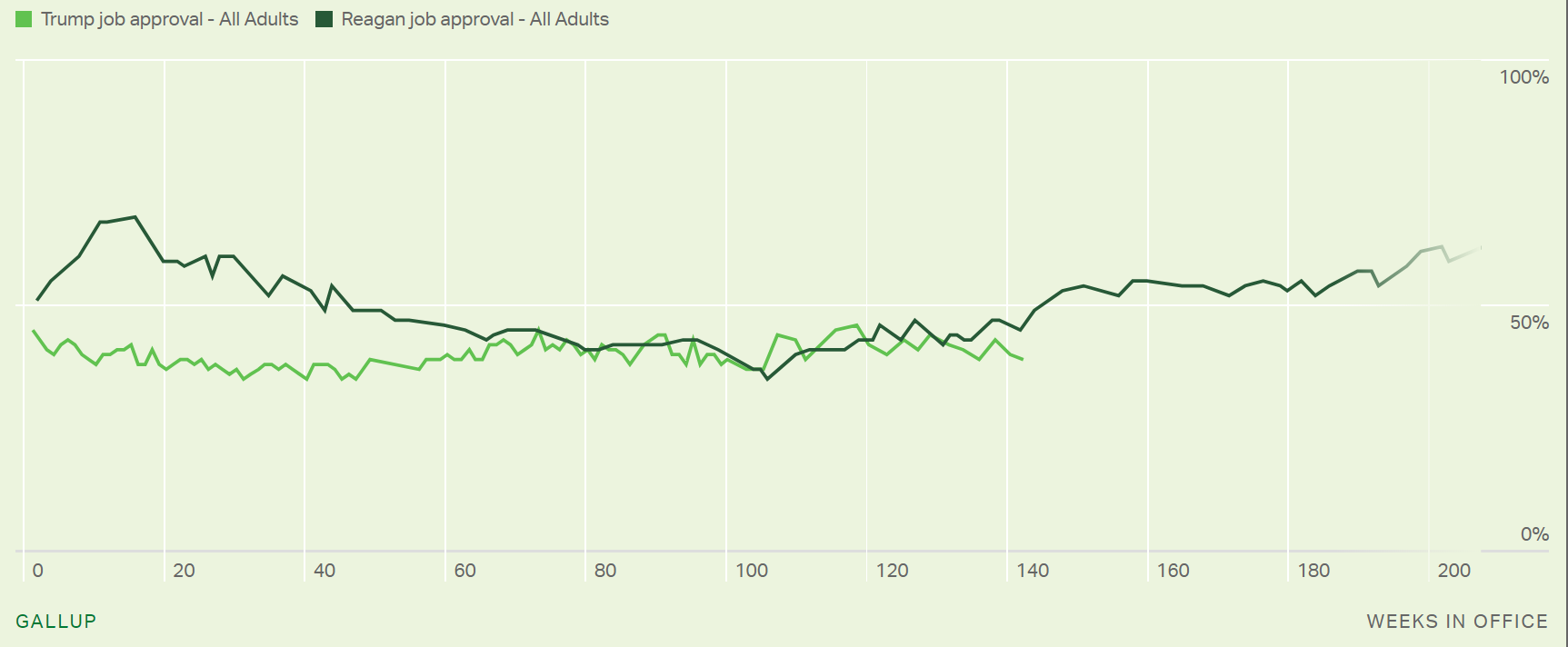
At 13 months out from Election Day, Trump most resembles Barack Obama, with a job approval rating of 39 percent (see Figure 4). But that is where the similarity ends.
Figure 4: Job Approval During First-Term for Obama and Trump
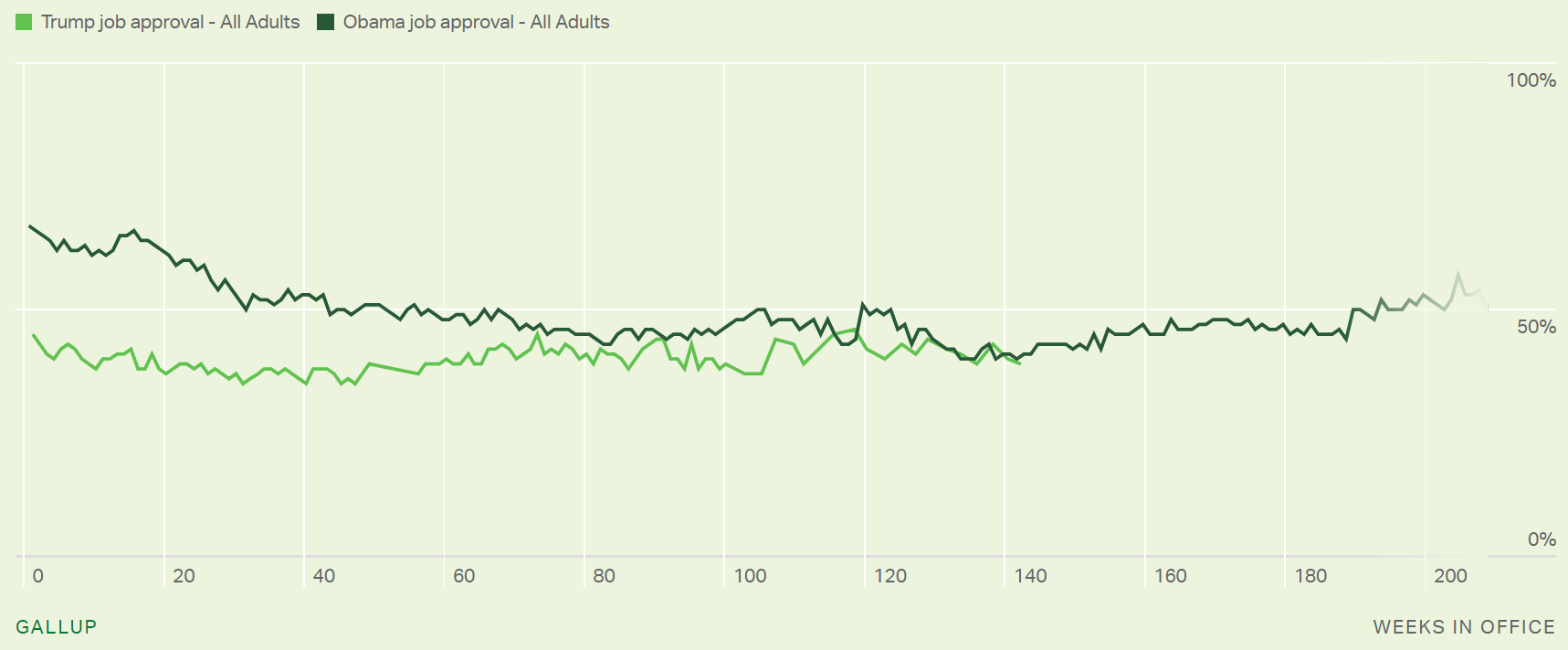
Every modern president, except Trump, has experienced significant periods of job approval (among U.S. adults) north of 50 percent. Obama had around 50 weeks above 50 percent during his first term. Trump has spent zero weeks in that territory. As Figure 1 (above) shows, Trump’s job approval appears to have a ceiling at around 45 percent. Only in the first couple of weeks of his presidency did Trump enjoy approval ratings above 45 percent — and then, just barely.
Is 45-percent job approval enough to win a presidential election?
Since it has never happened, the answer is probably ‘No.’ In the modern polling era, the lowest job approval near Election Day for a winning incumbent is Obama’s 50 percent (see Figure 5). Obama did have some margin of error in that regard, as he won the popular vote by 3.9 percentage points and the electoral vote by 62 percentage points. But would Obama at 45 percent approval have won in 2012? Probably not.
Figure 5: Comparison of Recent Presidents on Job Approval and Re-election Outcomes
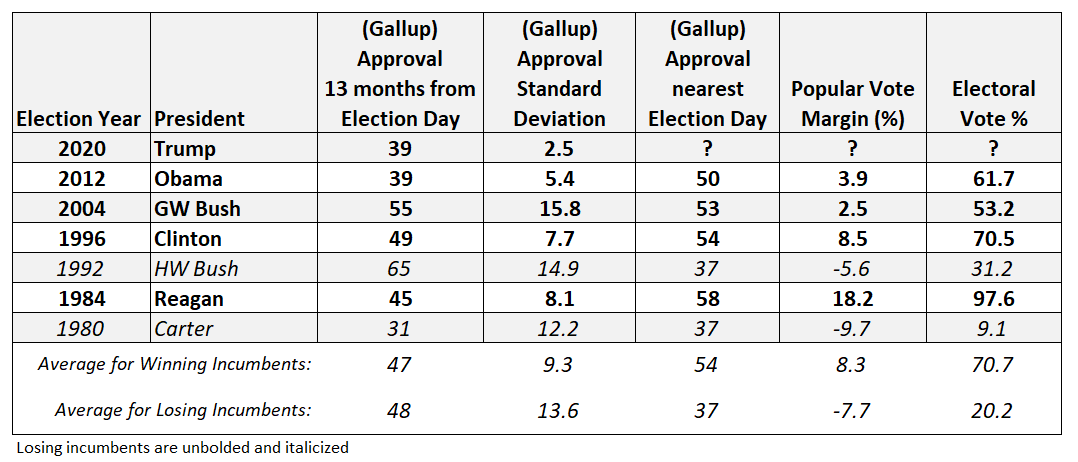
Figure 5 shows that winning incumbents have one thing in common: Job approval at or above 50 percent near Election Day. The two incumbent losers — Jimmy Carter and George H. W. Bush — possessed job approval ratings of 37 percent at that time. Not a good place to be.
And that is basically where Trump sits today.
Still, Trump is only 11 percentage points short of 50 percent approval. Thirteen months must be enough time for Trump to close the gap, right?
No, not for Trump it isn’t.
Trump’s uncommon problem is his lack of variation in job approval over time. For him to achieve 50 percent approval would require a magnitude of improvement unseen during his administration.
Figure 5 (above) puts Trump’s approval numbers in historical context. With a standard deviation of 2.5 percentage points, Trump has by far the lowest approval variance in of any president in the modern polling era. Second place is Obama with a standard deviation of 5.4 percentage points.
For Trump to achieve 50-percent approval, it would require a shift of four standard deviations from his mean approval level (39.7 percent approval — which is about where he is at now, according to Gallup). Based on his distribution of approval ratings over the past three years, there is about a 0.1 percent chance of Trump ever seeing 50-percent approval.
In other words, there is virtually no chance of Trump seeing approval numbers anywhere close to what he needs to get re-elected.
Even among the one-term presidents, both Carter and H. W. Bush experienced approval rates in excess of 50 percent (see Figure 6) during their administrations. Trump has no such experience and, most likely, never will.
Figure 6: Job Approval During First-Term for Carter, G HW Bush, and Trump

Am I being too pessimistic? Just because Trump has never enjoyed the approval of most Americans, that doesn’t mean it isn’t possible. Did Trump’s electoral victory in 2016 ever feel possible?
Suppose, instead, that Trump leverages the strong economy while turning a strong majority of American people against the impeachment process underway in the Democrat-controlled U.S. House [Right now, that scenario seems unlikely given recent polling data showing 49 percent of the public supports impeachment and removal.)
In months where Trump’s approval increases, on average in grows at about 0.8 percentage points per month. If, over the next 12 months, Trump’s approval grows each month at that rate, he would enter Election Day around 50 percent approval. Conceivably, he’d be a competitive candidate with that approval level— particularly if a third-party candidacy from the left emerges.
Unfortunately, there is no reason to believe that scenario is even remotely possible. Trump has never put together more than three consecutive months of approval growth. To win re-election, he needs 12 consecutive months.
So, why are many Republican pundits displaying so much confidence that Trump will win re-election?
GOP strategist Alex Castellanos thinks the polls undercount Trump’s support. (They don’t.)
Others point to Trump’s huge money advantage. (If the 2016 election teaches us anything, having more money isn’t always enough. Ask Hillary.)
And others assume the Democrats will find a way to screw up another winnable election.
The problem with GOP optimism is its requirement that Trump’s job approval will increase consistently on a scale unobserved heretofore.
Trump has never sniffed 50 percent approval and there is no evidence to think he will.
There are just too many firsts required for a Trump re-election victory to become a reality. To almost quote Hans Solo, presidential job approval just doesn’t work that way.
For Trump, the impeachment process is a cloudy day that won’t go away. Nowhere does GOP optimism get more delusional than when talking about the supposed backlash the Democrats are going to suffer if they pursue impeachment. Remember Clinton! is their battle cry. The American people will punish the Democrats for trying to remove a U.S. president over such a minor incident (the alleged Trump-Ukrainian quid pro quo deal) is their logic.
I do remember Bill Clinton. The Republicans tried to remove him for covering up an Oval Office blow job after years of trying (and failing) to indict him for financial misdeeds surrounding the infamous Whitewater land deal.
Clinton’s situation bears no resemble to one where Trump appears to — at least implicitly — ask a foreign leader to aid his presidential campaign by investigating Hunter Biden’s relationship with a Ukrainian energy company in exchange for the delivery of U.S. surface-to-air defense systems.
[Trump’s defense materializes in one of two forms: ‘It wasn’t an explicit double-dog-dare-you quid pro quo ’ or ‘The president is just really concerned about Ukrainian corruption and its implications on U.S. national security.’ Coincidently, when it is soon revealed Obama explicitly approved the surveillance of an opposition party’s presidential candidate, his defense will be similar to Trump’s ‘in the name of national security’ defense.]
The confidence among Trump’s flock begs the question: How could Trump’s approval gain during an impeachment process predicated on genuine evidence when it didn’t grow at all during the course of the Robert Mueller-led investigation of Russia-Trump collusion? An investigation predicated on exceptionally thin evidence for such an unparalleled allegation.
Trump needs to make the best out of a certain defeat. Certain defeats are prevalent throughout military and political history: The Greeks, 7,000 in number, blocking the passage of 70,000 Persian soldiers in the Battle of Thermopylae. The Chasseurs Ardennais disguising their numbers against the Nazi Wehrmacht in the Battle of Belgium. Walter Mondale picking Geraldine Ferraro as his running mate against Ronald Reagan in 1984. The Jewish Sicarii committing collective suicide on their mountain fortress at Masada rather than allow the Romans the satisfaction of a battle victory.
Despite their defeats, the defeated are remembered more for their heroics than their objective failures. Sure, in Mondale’s case, picking a female VP was more like a Hail Mary than an act of heroism. Nonetheless, history is often kind to losers who go down with honor and flair — particularly when their final act is seemingly selfless.
The words ‘selfless’ and ‘Trump’ are not often used in the same sentence, but a selfless act may be the only “winning” option left for the President. A drubbing at the hands of Bernie Sanders or Elizabeth Warren is not going to help the Trump brand, much less a Republican Party on the verge of losing the presidency, House and Senate.
For the sake of his party and his legacy, Trump would be better served walking away from the 2020 election, giving his party at least a puncher’s chance to keep the presidency. Former UN ambassador Nikki Haley or Texas Senator Ted Cruz are more than capable of taking the baton on short notice and putting forth a credible presidential campaign.
He can do a nationwide tour promoting his greatest and most perfect accomplishments. Throngs of devotees can gush over him with messianic-like adoration. Everything he cares most about — himself — confirmed in a series of uncensored, glorious pep rallies.
Just as the Sicarii denied the Romans their want for a victory in battle, Trump can deny the Democrats their want for his head on the figurative platter.
The Roman-era Jewish historian Titus Flavius Josephus described what the Roman army found when the scaled Masada’s steep walls:
Now for the Romans, they expected that they should be fought in the morning, when accordingly they put on their armor, and laid bridges of planks upon their ladders from their banks, to make an assault upon the fortress, which they did, but saw nobody as an enemy, but a terrible solitude on every side, with a fire within the place as well as a perfect silence.
Battle glory denied.
Trump is not going to win the 2020 election and will likely take down the Republican majority in the U.S. Senate in the process, and probably an innumerable number of state officeholders as well.
For the good of his party and his own self-interest, Trump needs to end his 2020 presidential campaign.
- K.R.K.
Praise and insults can be sent to: kroeger98@yahoo.com
